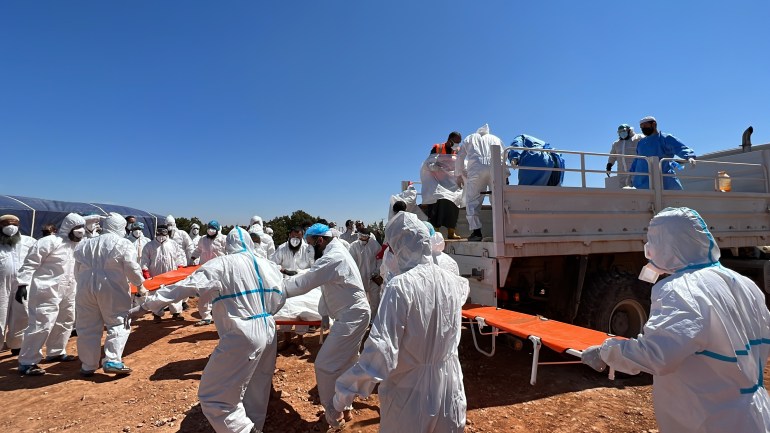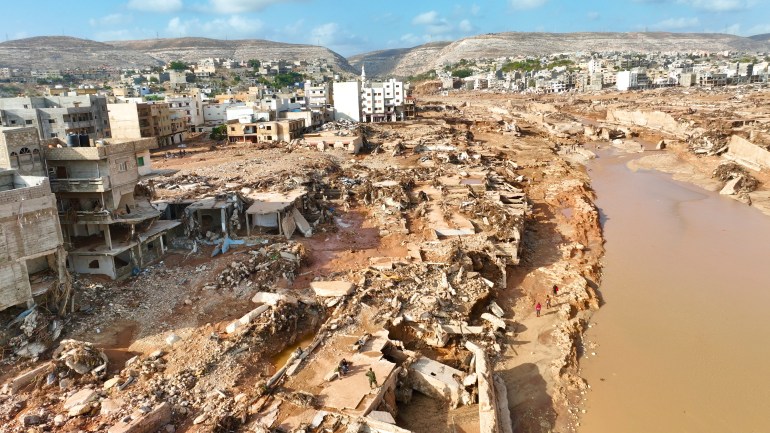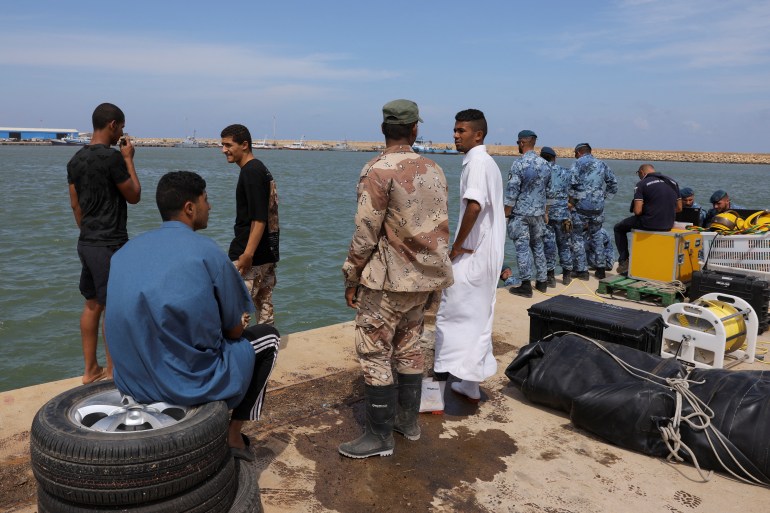Libya floods: Conflicting death tolls, Greek aid workers die in crash
The city of Derna in eastern Libya is still digging out and counting the dead after devastating floods struck more than a week ago.

Confusion has emerged over the death toll from the September 10 disaster after the United Nations Office for the Coordination of Humanitarian Affairs (OCHA) at the weekend announced 11,300 dead and 10,100 missing in Derna and an estimated 170 other people killed elsewhere in eastern Libya.
OCHA attributed the death toll to the Libyan Red Crescent, but its spokesman Tawfiq al-Shukri rejected the figures, telling dpa: “The official numbers are issued by the agency authorised by the Libyan authorities.”
Keep reading
list of 4 itemsLibya continues search for the missing as bodies wash up on its shores
Photos: One week after Libya flood, aid arrives for survivors
A week after deadly Libya floods, aid effort gathers pace
In a later situation report, OCHA instead cited the World Health Organization figures of 3,958 people dead and more than 9,000 still missing.
A group of Libyan data analysts and researchers also said there had been about 4,000 confirmed deaths in a count on Saturday.
Late on Sunday, Othman Abdel Jalil, the eastern government’s health minister, told a news conference 3,283 people had been buried so far.

Destruction, displacement
Derna is still reeling in the aftermath of the veritable bomb created when millions of cubic metres of water broke through two neglected dams during Storm Daniel more than a week ago and tore through the eastern Libyan city.
The water erased large areas in the heart of the city, which had been home to about 100,000 people.
The oil-rich North African country is split between two rival governments – a UN-recognised administration in the capital, Tripoli, and one based in the disaster-hit east. This has made relief efforts chaotic and accurate information has been hard to come by.
Ugochi Daniels, deputy director general for operations at the International Organization for Migration, told Al Jazeera the latest estimate of those displaced by the flood is 46,000.
Badr Al-Din Al-Toumi, head of emergency and rapid response for the government based in Tripoli, said 1,500 of a total of 6,142 buildings in Derna had been affected by flooding with “891 buildings completely destroyed, 211 buildings partially destroyed and about 398 buildings submerged in mud”.

Libyans from across the divided country have driven through old front lines to deliver aid to Derna. Aid being sent to Libya includes water, food, tents, blankets, hygiene kits, medicines and emergency surgical supplies, body bags and heavy machinery to clear the debris.
Emergency response teams and aid have been deployed from France, Iran, Russia, Saudi Arabia, Tunisia, Turkey and the United Arab Emirates with more on the way from other nations as international officials say much more is needed.
In al-Badya, about 100km (62 miles) west of Derna, the hospital is struggling to cope with an influx of patients after also being hit by the storm.
“Due to the damage in Derna of the hospital, some cases couldn’t be treated, especially critical cases with chronic diseases and the intensive care unit. They’re now here and in stable condition,” the hospital’s head, Abdel Rahim Mazek, told Al Jazeera.
The al-Badya medical staff had to build makeshift dams in the streets to try to hold the water back from the hospital, but it still rose in the building, damaging equipment on lower levels.

Greek humanitarian workers killed in a road accident
Five members of a Greek humanitarian aid team sent to Libya have been killed in a road accident, the Greek army said on Monday.
“Five bodies, including three officials of the Greek army and two translators from the Greek foreign ministry who were part of the aid team, will be repatriated to Athens on Monday,” the Greek chiefs of staff said in a statement.
Abdel Jalil said the accident occurred when a vehicle carrying 19 members of the Greek team collided with a car carrying a Libyan family. Three people in the family’s car died and two were seriously injured, he said.
Warnings about dams went unheeded
Information emerged that experts had long been warning about the two dams upstream from Derna, repeatedly calling for them to be maintained, but successive governments did not do so in spite of money being disbursed for their maintenance.
The Abu Mansour and Derna dams were built by a Yugoslav construction company in the 1970s and were meant to protect the city from flash floods, which are not uncommon in the area. Water collected behind the dams was used to irrigate crops.
“Both dams had not been maintained for many years despite repeated floods that struck the city in the past,” said Saleh Emhanna, a geological researcher with the University of Ajdabia in Libya, told the Agence France-Presse news agency. “They were dilapidated.”
The dams suffered major damage in a storm in 1986, and more than a decade later, a study commissioned by the Libyan government revealed cracks and fissures in their structures, Libya’s general prosecutor, al-Sediq al-Sour, said on Friday.
A report by a state-run auditing agency in 2021 said the two dams had not been maintained despite the allocation of more than $2m for that purpose in 2012 and 2013.
At a news conference in the stricken city, al-Sour said prosecutors would investigate the collapse of the two dams and where the maintenance funds went.